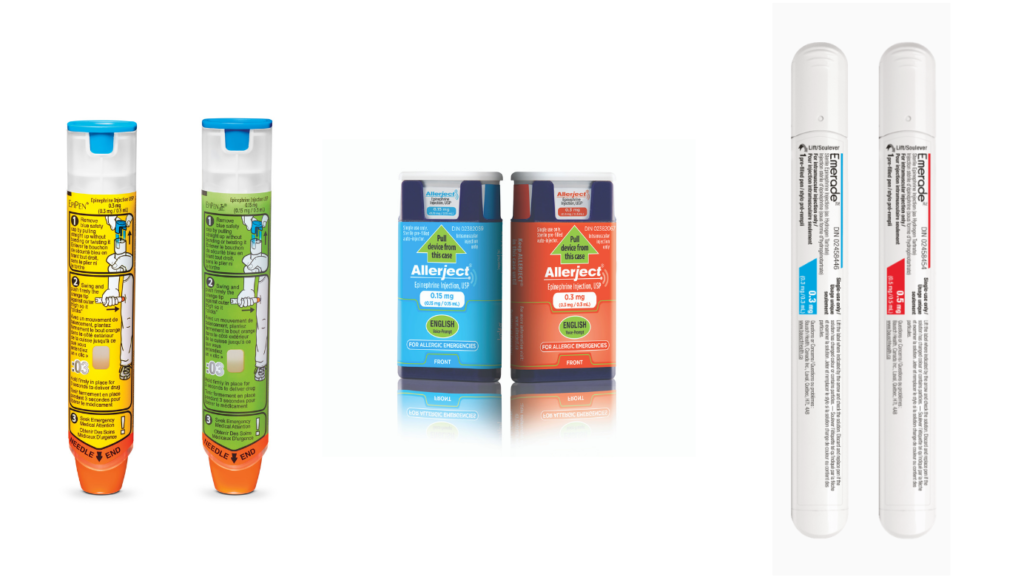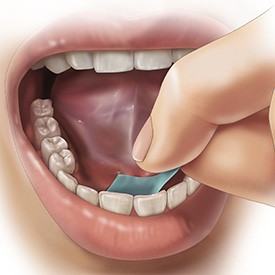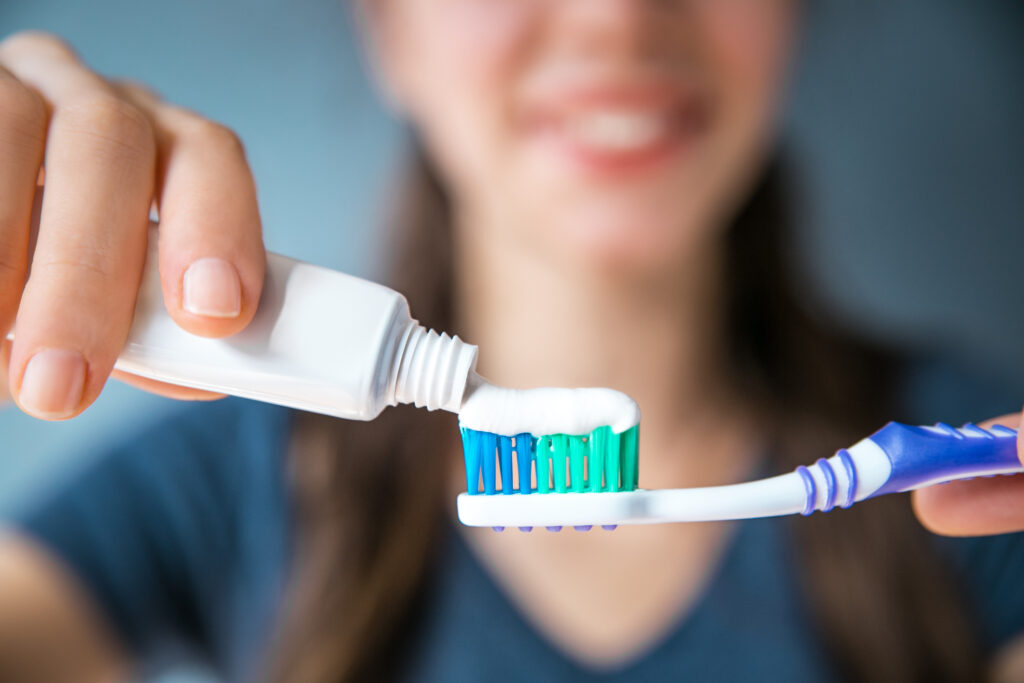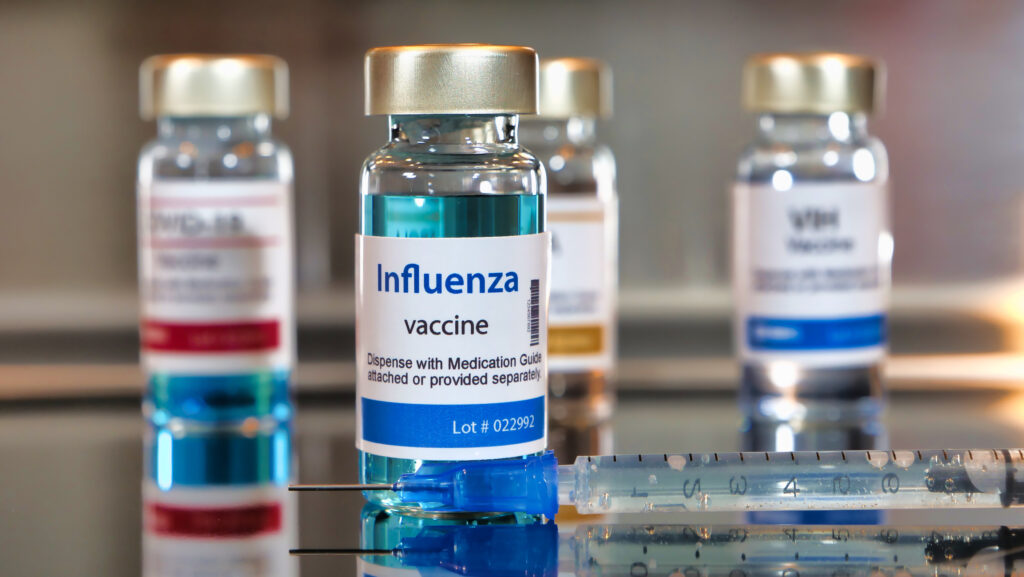Advocate now by completing two surveys – one on ensuring epinephrine auto-injectors continue to be accessible without a prescription, and another on food allergy and airline travel. Check out what’s new in food allergy research, from needle-free epinephrine products to toothpaste immunotherapy to treat peanut allergy, and participate in a study on birch allergy. Plus, check out our mythbuster on whether it is safe to get a flu shot it you have an egg allergy.
Participate: Help us ensure epinephrine auto-injectors continue to be accessible without a prescription

Health Canada is asking Canadians through an open consultation about exemptions for prescription medication. We need your help to ensure epinephrine auto-injectors (e.g. EpiPen®, ALLERJECT®, EmeradeTM) continue to be exempt on Health Canada’s prescription drug list.
Having easy and prompt access to epinephrine auto-injectors as a ‘behind the counter medication’, that can be purchased without a prescription, is essential for daily management and being confident that you are prepared to treat a reaction if required. Plus, the exemption allows for others within the community to access and provide stock epinephrine auto-injectors (devices that are not prescribed to a specific person) for the emergency treatment of anaphylaxis – this is particularly important for unexpected first time reactions.
Please complete Health Canada’s short survey to ensure auto-injectors continue to be accessible without a prescription by November 29, 2022. Fill out the survey with the following:
- For Question A – select “Cardiovascular and respiratory agents”
- For Question 1 under “Cardiovascular and respiratory agents” select:
- 1.5 Epinephrine autoinjectors
- Fill in the open box text in the survey to explain why the inclusion of epinephrine auto-injectors is important to you. To make it easier, you can copy and paste this paragraph:
Epinephrine auto-injectors are critical for people living with food allergy and at risk of anaphylaxis. Immediate access to this medication is needed for people at risk and those who care for them, especially when unexpected first time reactions occur. As such, a prescription should NOT be required for these life-saving devices and they should continue to be on the exemption list.
We will also be providing a written submission to Health Canada to request their continued support to keep epinephrine auto-injectors on the exemption list.
Participate: International study on food allergy and airline travel

A global research team led by US-based Northwestern University is conducting a study to learn more about air travel experiences by people with food allergy. Have your say by completing the survey, and please share with others.
Research: Participate in a birch allergy study

A birch allergy study is underway at Cliantha Research in Mississauga, Ontario. They are seeking healthy adults to participate in this study.
As there is cross-reactivity with birch pollen and certain fresh fruits, vegetables and tree nuts, some members in the food allergy community who may also have a birch allergy might be interested in this study or know affected individuals who could be interested.
Following is the announcement from the research team for your information and for sharing with individuals with birch allergy.
From the research team:
Enrolling participants for a birch allergy study
Clinical trial at Cliantha Research
Cliantha Research in Mississauga, Ontario is enrolling participants for a birch allergy study. Our experienced research team, led by Dr. Patricia Couroux, is working closely with pharmaceutical organizations to explore therapies for people with birch allergies.
What is the purpose of this study?
The study is researching study drugs called REGN5713, REGN5714, and REGN5715 in different combinations with each other to understand whether more antibodies, as compared to fewer antibodies or a single antibody, provide greater improvement in nose and eye allergy symptoms due to birch pollen allergy in adults. The aim of the study is to see how effective the study drugs are at reducing allergic nose and eye symptoms. Allergic symptoms will be observed in an Environmental Exposure Unit (EEU) (both during and not during the birch pollen season) and during the natural birch pollen season. Allergic nasal symptoms can include congestion, runny nose, and sneezing. Allergic eye symptoms can include redness, itching, and swelling.
What are REGN5713-5714-5715, REGN5713-5715, and REGN5715?
REGN5713, REGN5714, and REGN5715 are investigational monoclonal antibodies. Antibodies are proteins produced by the body to fight against different types of disease. REGN5713, REGN5714, and REGN5715 are produced in a laboratory and bind to Bet v 1. Bet v 1 is a part of birch pollen that makes most people who are allergic to birch pollen have allergy symptoms. REGN5713-5714-5715 is a mixture of all 3 antibodies and REGN5713-5715 is a mixture of just REGN5713 and REGN5715. Please note that this clinical trial will use an investigational drug product. The safety and efficacy of which has not been fully evaluated by Regulatory Authorities, including Health Canada, and has no received marketing authorization in any country.
Main eligibility criteria for participation
- Healthy males and non-pregnant females
- At least 18 years of age at time of medical screening
- Allergy to birch pollen
- Additional criteria will be assessed during the telephone pre-qualification assessment and during medical screening
Study duration
The study duration is approximately 46 weeks consisting of 13 clinic visits at Cliantha Research in Mississauga and two follow up telephone calls. There is also an in-home component to answer questions about symptoms recorded in an electronic diary that will be provided to study participants.
Compensation for participation
The compensation is $10,530 CAD for completion of the study in its entirety. Participants who qualify in Visit 1 and attend Visit 2, will receive the V1 compensation amount of $150 during Visit 2. Once enrolled and due to the length of the study, participants will be eligible to receive compensation on a prorated basis at the completion of Visit 4, Visit 8, Visit 10, and Visit 13. Final study compensation for Visit 14, Visit 15, and the completion amount will be paid within 10 business days of study completion.
How to participate
Step 1: Pass a telephone questionnaire to determine pre-qualification and registration (approximately a 20-minute call with a recruitment coordinator).
Step 2: Medical screening at the Cliantha Research clinic in Mississauga (approximately 5-6 hrs.). During this visit, the following will occur:
- You will be provided with details of the study including any procedures, tests and/or any other aspects of the study which is investigational.
- You will be able to review the informed consent form.
- You will have the chance to ask any questions you may have about the study.
- If you elect to sign the consent form, the study doctor or study staff will perform tests to determine if you meet all the requirements to participate in this study.
Participation and confidentiality
Participation in the study is entirely voluntary. You may refuse to participate, or you may discontinue your participation at any time without explanation. All information obtained during these studies will be kept strictly confidential. The research data will be available only to the research team. This study has been reviewed by Advarra IRB, an independent Research Ethics Board.
Registration
To register for the study, contact us directly at (905) 282-1808 or click on the following link, and a Cliantha team member will contact you within 24 hours: https://www.atcliantha.com/mississauga/register_to_participate.html
Registration Deadline: 26-Nov-2022
Questions
Please contact the Cliantha Recruitment Team at (905) 282-1808 and we’d be happy to answer your questions and provide more study information. Our office hours are Monday to Friday 8:30am – 6:00pm and Saturday 8:30am – 4:30pm.
Cliantha Research Clinic
4500 Dixie Road
Mississauga, ON L4W 1V7
Online study information
Clinical Trials.gov website click on this link: https://clinicaltrials.gov/ct2/show/NCT05430919?cond=NCT05430919&draw=2&rank=1
Cliantha Research volunteer website click on this link: https://www.atcliantha.com/mississauga/study_ref_no_C2D02407.html
Research: Needle-free epinephrine product developments

US-based Aquestive Therapeutics has announced positive written feedback from the U.S. Food and Drug Administration (FDA) on its AQST-109 product, a sublingual film that can be applied under the tongue for delivery of epinephrine.
“We are excited by the FDA’s written response confirming our approach and supporting the characterization of our novel drug platform – a factor that will accompany our NDA filing for this product,” said Daniel Barber, Chief Executive Officer of Aquestive. “The positive Agency response reinforces our development plans and approach as we continue to progress the AQST-109 program, including in critical areas such as assigning shelf life. We are looking forward to our next scheduled interaction with the FDA later this quarter where we will discuss the results of our EPIPHAST studies and our clinical development plan.”
Read their press release for more information.
Needle-free epinephrine products in development for treatment of anaphylaxis include both sublingual film and nasal sprays; we’ll continue to keep you updated with news.
Research: Toothpaste immunotherapy to treat peanut allergy

US-based Intrommune Therapeutics has announced completion of phase 1 enrollment in a clinical study for patients with peanut allergy. In this study, adults with peanut allergy may receive an escalating dose of INT301. INT301 is an oral mucosal immunotherapy (OMIT); it comes in the form of a toothpaste to be incorporated into a person’s daily toothbrushing routine.
“Fully enrolling the OMEGA Clinical Study is a significant milestone for Intrommune as we continue to progress our innovative platform of products to help patients with food allergies, including peanut allergy,” said Michael Nelson, CEO, Intrommune Therapeutics. “We are encouraged that, to date, patients enrolled in our OMEGA Clinical Study have only experienced mild, transient adverse events with no use of emergency epinephrine. Additionally, we have both been able to safely start patients at dose 4 which may shorten the time to reach maintenance therapy by several weeks, and successfully dosed patients to a dosage higher than our expected maintenance dose.”
Read their press release for more information.
It’s encouraging to hear news of developments in allergy treatments and therapies, and we’ll continue to share the information with you.
Mythbuster – If you have an egg allergy, is it safe to get a flu shot?

With flu season upon us, read our mythbuster to find out whether it is safe to get flu shot if you have an egg allergy.
Help us educate your communities and share this mythbuster with them! Find more mythbusters at foodallergycanada.ca/mythbusters.
Tags: advocacy, call for participation, Epinephrine, mythbuster, Oral Allergy Syndrome, participate in research, Research
